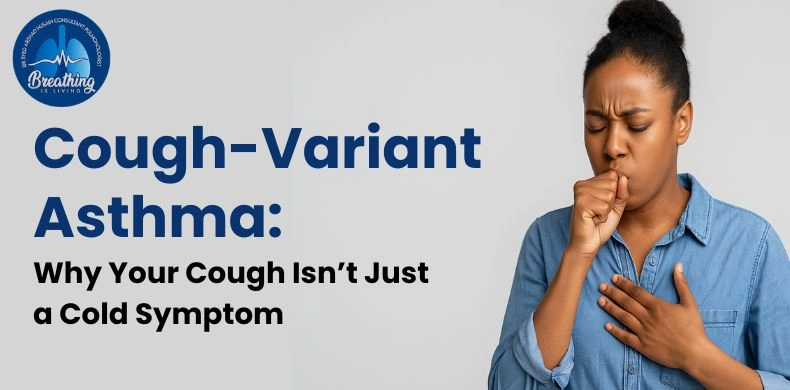1. Cough-Variant Asthma: Why Your Cough Isn�t Just a Cold Symptom
Are you coughing for weeks and don�t know why it isn�t stopping, even after drinking cough syrups? We don�t want to scare you, but if it is happening, and you are not feeling cold or fever, which usually happens when a person feels infectious and even your throat is clear but still you are cough won�t go away especially at night, then be chance that you are having CVA or Cough Variant Asthma.
Which means you might be dealing with more than a leftover virus.
Cough-variant asthma (CVA) is a lesser-known form of asthma where the main (and sometimes only) symptom is a persistent, dry cough. Unlike typical asthma, you may not wheeze or gasp�but your lungs are still inflamed and reactive.
In this blog, we�ll explore:
- What CVA is and how it differs from regular asthma
- Common triggers and symptoms
- Diagnosis and treatment
- Tips to manage and reduce flare-ups
What is Cough-Variant Asthma?
Cough-variant asthma is a type of chronic airway inflammation where coughing is the primary symptom. Unlike classic asthma, it usually doesn�t cause wheezing, but still involves bronchial hyperresponsiveness�meaning your airways overreact to irritants.
The cough is often dry, persistent, and worsens at night or after physical activity. Left untreated, it can progress into classic asthma.
How is it Different from a Regular Cough?
A regular cough from a cold or infection usually resolves within 1�2 weeks. But with CVA:
- The cough lingers for 6�8 weeks or longer
- It is non-productive (dry)
- There�s no fever, body ache, or sore throat
- It comes and goes in waves, often triggered by exercise, cold air, or strong smells
- You might notice shortness of breath with exertion, even if subtle
What Causes Cough-Variant Asthma?
The exact cause of CVA is unknown, but airway hypersensitivity is the key problem. Here are some known triggers:
1. Allergens
Dust mites, pet dander, pollen, and mold can all irritate the airways.
2. Cold Air
Sudden exposure to cold or dry air can trigger coughing fits.
3. Exercise
Especially common in children and young adults, physical activity can bring on coughing episodes.
4. Strong Smells or Smoke
Perfumes, smoke, air fresheners, and pollution can irritate already-sensitive lungs.
5. Viral Infections
Past colds or respiratory infections can leave the airway hyper-reactive for weeks, triggering CVA.
How is Cough-Variant Asthma Diagnosed?
Since CVA doesn�t present like classic asthma, it�s often misdiagnosed as a chronic cough, throat allergy, or post-viral irritation.
Diagnosis involves:
?? Medical History
Your doctor will ask about the duration, timing, and triggers of your cough.
?? Lung Function Tests (Spirometry)
These check for airway obstruction and response to bronchodilators.
?? Methacholine Challenge Test
If spirometry is inconclusive, this test is used to provoke airway narrowing, helping confirm CVA.
?? Chest X-rays or Allergy Testing
Done to rule out other causes like infection or GERD.
Treatment Options: Getting Your Breath Back
Treating CVA aims to reduce inflammation and prevent progression to full-blown asthma. Typical treatments include:
1. Inhaled Corticosteroids (ICS)
First-line treatment. Reduces airway inflammation and stops the cough over time.
2. Bronchodilators
Short-acting inhalers (like albuterol) relieve coughing fits triggered by exercise or irritants.
3. Antihistamines
Helpful if allergies play a role in your symptoms.
4. Leukotriene Modifiers
Oral medications like montelukast reduce allergic airway inflammation but it should be prescired by an expert pulmonologist.
Important: Self-medicating with over-the-counter cough syrups won�t help much. You need targeted asthma treatment for real relief.
When to See a Doctor
Seek medical help if:
- Your cough lasts longer than 3 weeks
- It gets worse at night or after exercise
- You feel short of breath, tired, or notice chest tightness
- Your usual cough meds aren�t working
Early diagnosis of CVA can prevent complications and improve quality of life dramatically.
Final Thoughts: Don�t Ignore That Lingering Cough
A persistent dry cough isn�t always harmless. Cough-variant asthma is often missed or misdiagnosed, but it�s manageable with the right approach.
The key is awareness. If you or your child have a cough that just won�t quit, even when everything else seems fine�don�t chalk it up to a leftover cold or seasonal allergy. Meet a professional pulmonologist like Prof. Dr. Syed Arshad Husain in Dubai for a proper diagnosis and effective treatment plan.



